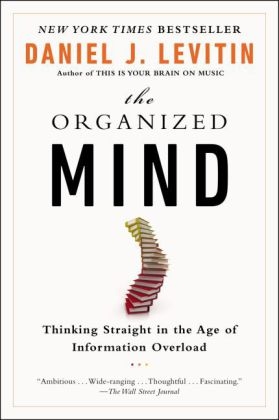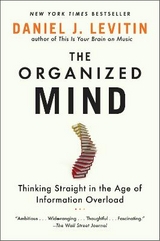
The Organized Mind
Penguin US (Verlag)
978-0-14-751721-0 (ISBN)
- Titel erscheint in neuer Auflage
- Artikel merken
Daniel J. Levitin ist James-McGill-Professor für Psychologie und Neurowissenschaften an der McGill University in Montreal und leitet dort das Laboratory for Musical Perception, Cognition, and Expertise. Bevor er sich der neurowissenschaftlichen Forschung zuwandte, war er Musikproduzent mit mehreren goldenen Schallplatten und professioneller Musiker. Levitin hat nicht nur die U.S. Navy beraten (in Fragen der technischen Trennung von Lautquellen), sondern auch mehrere Rockbands (darunter Grateful Dead und Steely Dan) zum Thema Audioqualität sowie verschiedene Musikfirmen. Er hat zahlreiche Artikel in wissenschaftlichen Zeitschriften wie auch in Musikmagazinen wie Grammy und Billboard veröffentlicht.
Daniel Levitin is the James McGill Professor of Psychology and Neuroscience at McGill University. Before entering academia he worked as a session musician, sound engineer and record producer.
Praise for THE ORGANIZED MIND
"[An] impressively wide-ranging and thoughtful work..."The Organized Mind" is an organized book, but it also rewards dipping in at any point, for there are fascinating facts and examples throughout." - The Wall Street Journal
"From how not to lose your keys to how to decide when the risks of surgery are worth it, Levitin focuses on smart ways to process the constant flow of information the brain must deal with." - The Washington Post
"[M]ore than a self-help book...Levitin's insights into sleep, time, socializing and decision-making are profound." - San Jose Mercury News
"[An] ingenious combination of neuroscience and self-help." - Kirkus
"Dan Levitin has more insights per page than any other neuroscientist I know. The Organized Mind is smart, important, and as always, exquisitely written." -Daniel Gilbert, Harvard University, author of Stumbling on Happiness
" Combine genuine knowledge and scholarship with plain common sense and what do you get? A book that is really worth reading: Dan Levitin's The Organized Mind ." -The Honorable George P. Shultz, 60th U. S. Secretary of State
"There are surprising parallels between Levitin's work and mine. Today's environment in war, business, and just about everything else has increased in speed and complexity to the point where the essential quality required for success is adaptability. The Organized Mind provides the latest neuroscience on cognitive adaptability and how to apply it to so that leaders can excel. It is a tremendous achievement, and a must read for leaders at every level." - General Stanley McChrystal, U. S. Army (ret.)
"A brilliant and engaging book about the science of thinking. The Organized Mind provides the tools that we all need to understand and manage the deluge of information that assaults us every day." - Jerome Groopman, MD and Pamela Hartzband, MD, Harvard Medical School, authors of Your Medical Mind
"A profound piece of work. Levitin documents the mismatch between our narrow bandwidth hunter-gatherer minds and the multitasking chaos of today's world. He even shows us how to stay sane in environments that are constantly tempting us to stretch ourselves hopelessly thin." - Philip E. Tetlock, Wharton School, University of Pennsylvania
"An erudite synthesis of Levitin's own contributions, recent advances in our understanding of attention and memory, and a deep perspective on the ways the human mind works." -Stanley Prusiner, M.D. Nobel Laureate, director of the Institute for Neurodegenerative Diseases, University of California, San Francisco
"Daniel Levitin's book follows in the ancient tradition of knowledge as a guide to a better life. Discover the creative power of organized thought, whether you are a writer or a scientist, a disorganized mess or a super robot seeking new frontiers of effectiveness." - Eric Kaplan, co-executive producer and writer, The Big Bang Theory , writer, The Simpsons and Flight of the Conchords
"An eloquent spokesperson for our field. Levitin writes about the brain with an ease and familiarity that is captivating." -The late David Hubel, Nobel Laureate in honor of discoveries concerning information processing in the human visual system
"Fascinating... Combing neuroscience and cognitive psychology, the Organized Mind underscores the critical importance of individuals taking charge of their own attentional and memory systems so they can lead optimally productive and satisfying lives. Invaluable insights are offered with regard to organizing our homes, social world, time, decision-making, and business world." - Nadine J. Kaslow, Ph.D., president of the American Psychological Association and professor and vice chair, Emory University School of Medicine
"This book is far more than tips on how to think clearly and manage information overload. It is also a tour through some of the most exciting aspects of contemporary neuroscience and cognitive science, with a specific emph
INTRODUCTION Information and Conscientious Organization We humans have a long history of pursuing neural enhancement-ways to improve the brains that evolution gave us. We train them to become more dependable and efficient allies in helping us to achieve our goals. Law schools, business schools, and medical schools, music conservatories and athletic programs, all strive to harness the latent power of the human brain to deliver ever higher levels of achievement, to provide an edge in a world that is increasingly competitive. Through the sheer force of human ingenuity, we have devised systems to free our brains of clutter, to help us keep track of details that we can't trust ourselves to remember. All of these and other innovations are designed either to improve the brain we have, or to off-load some of its functions to external sources. One of the biggest advances in neural enhancement occurred only 5,000 years ago, when humans discovered a game-changing way to increase the capacity of the brain's memory and indexing system. The invention of written language has long been celebrated as a breakthrough, but relatively little has been made of what exactly were the first things humans wrote-simple recipes, sales receipts, and business inventories mostly. It was around 3000 BCE that our ancestors began to trade nomadic lifestyles for urban ones, setting up increasingly large cities and centers of commerce. The increased trade in these cities put a strain on individual merchants' memories and so early writing became an important component of recording business transactions. Poetry, histories, war tactics, and instructions for building complex construction projects came later. Prior to the invention of writing, our ancestors had to rely on memory, sketches, or music to encode and preserve important information. Memory is fallible, of course, but not because of storage limitations so much as retrieval limitations. Some neuroscientists believe that nearly every conscious experience is stored somewhere in your brain; the hard part is finding it and pulling it out again. Sometimes the information that comes out is incomplete, distorted, or misleading. Vivid stories that address a very limited and unlikely set of circumstances often pop to mind and overwhelm statistical information based on a large number of observations that would be far more accurate in helping us to make sound decisions about medical treatments, investments, or the trustworthiness of people in our social world. This fondness for stories is just one of many artifacts, side effects of the way our brains work. It's helpful to understand that our modes of thinking and decision-making evolved over the tens of thousands of years that humans lived as hunter-gatherers. Our genes haven't fully caught up with the demands of modern civilization, but fortunately human knowledge has-we now better understand how to overcome evolutionary limitations. This is the story of how humans have coped with information and organization from the beginning of civilization. It's also the story of how the most successful members of society-from successful artists, athletes, and warriors, to business executives and highly credentialed professionals-have learned to maximize their creativity, and efficiency, by organizing their lives so that they spend less time on the mundane, and more time on the inspiring, comforting, and rewarding things in life. Cognitive psychologists have provided mountains of evidence over the last twenty years that memory is unreliable. And to make matters worse, we show staggering overconfidence in many recollections that are false. It's not just that we remember things wrongly (which would be bad enough), but we don't even know we're remembering them wrongly, doggedly insisting that the inaccuracies are in fact true. The first humans who figured out how to write things down around 5,000 years
| Sprache | englisch |
|---|---|
| Maße | 134 x 202 mm |
| Gewicht | 375 g |
| Themenwelt | Literatur |
| Geisteswissenschaften ► Philosophie ► Allgemeines / Lexika | |
| Geisteswissenschaften ► Psychologie | |
| Schlagworte | Englisch; Romane/Erzählungen |
| ISBN-10 | 0-14-751721-4 / 0147517214 |
| ISBN-13 | 978-0-14-751721-0 / 9780147517210 |
| Zustand | Neuware |
| Haben Sie eine Frage zum Produkt? |
aus dem Bereich



